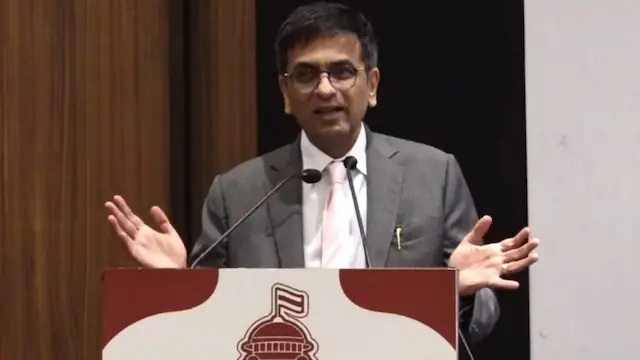As rising public anger surrounding the disturbing case of Pune bus rape, former Chief Justice of India (CJI) DY Chandrachud, stressed the necessity for the effective working (implementation) of existing laws on cases of crime against women on Thursday. Recalling the infamous 2012 Nirbhaya case, he stated that while laws are essential, their effectiveness depends on strict enforcement and societal responsibility.
Speaking to reporters on the sidelines of a program, Chandrachud addressed concerns regarding the recent rape case in Pune’s Swargate area. The incident involved a 26-year-old woman who was allegedly raped inside a Maharashtra State Road Transport Corporation (MSRTC) bus by a man identified as Dattatray Ramdas Gade. The accused, a 37-year-old history-sheeter, managed to flee the scene, prompting the police to form thirteen teams to track him down.
Chandrachud also pointed out that legislative reform, in the absence of effective implementation, is not a solution to crimes against women. He emphasized that substantial changes were introduced to legislation after the 2012 Nirbhaya attack, but incidents of sexual violence still take place.
The Nirbhaya case, which shook the nation, involved the brutal gang rape of a 23-year-old physiotherapy student on a moving bus in Delhi. The victim Nirbhaya (the fearless one) died, igniting protests across the country and the consequent reforms in the law, such as the anti-sexual assault law and the fast-track courts for such offences.
Drawing a comparison between the two events, Chandrachud further stated that the onus of ensuring women’s safety does not fall solely on the presence of laws, but upon their implementation as well. “We cannot prevent such incidents by only having laws. It is their task and that of society, along with the authorities, in addition to the law, to carry out this task effectively. There are large numbers of women travelling and working every day, and it is very important that they are safe in public spaces, he added.
He further stressed that a comprehensive approach is required to tackle such crimes, which includes proper investigation, swift legal action, and stringent punishment for offenders. According to him, the police and the legal system have a significant role in ensuring justice for victims and deterring potential criminals.
“At every level, we should think about this carefully so that women can do their jobs safely. That is the bedrock of a just society, Chandrachud said. He requested structural reforms in law enforcement, with a focus on faster trials and more severe sentences to create terror among criminals.
The Pune bus sexual assault has again started to create doubts and concerns regarding safety of women in India despite a number of legal amendments. Activists and legal professionals assert that although legislation has been tightened with time, implementation has continued to be one of the biggest challenges. Reports of sexual violence are still coming to light, highlighting the demands for enhanced policing, surveillance, and public education.
Following this recent incident, the authorities in Maharashtra have promised to mete out strict punishment to the culprits and tighten security in public transport. Police have guaranteed prompt measures to catch Gade, and the authorities are facing pressures to improve the peoples’ security during the travel of women, etc.
Backlash to the case has been strong, with many calling for even stricter law enforcement and enhanced security for women. Demonstrations and social media have exposed problems of repeated cases of sexual violence and lack of justice system efficiency.
[One (i.e., Chandrachud) emphasizes that legislative enactments may all too conveniently suffice in facilitating change without the necessity of effective enforcement, societal oversight, and a strong commitment to women’s security]. His call for a holistic response, by law enforcement, judiciary, and community, resonates with an insistent need for expeditious and efficacious responses to crimes perpetrated on women.
With India still facing the problem of violence against women, 2 examples of such violence as the Pune bus rape case highlight the necessity to guarantee that laws put in place to help safeguard women are truly applied. The attention should now be directed away from just legislating, to doing the following, which will provide safety, justice and deterrence, from such crimes of barbarism. This is only at the end viable, secure and equitable society can be achieved for women.
(Input from PTI & News18)
“Stay updated with the latest news and insights – follow us at YPBB News on X for real-time”
